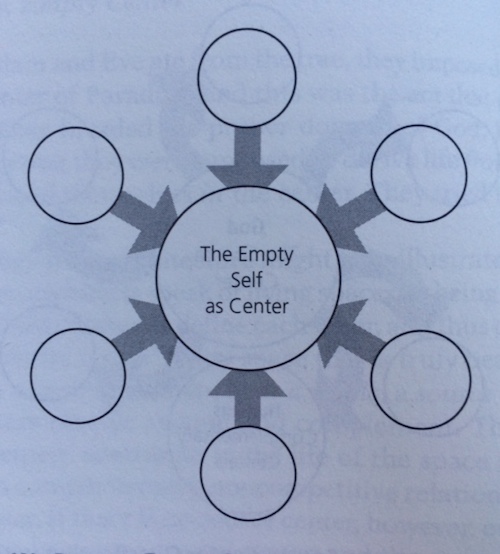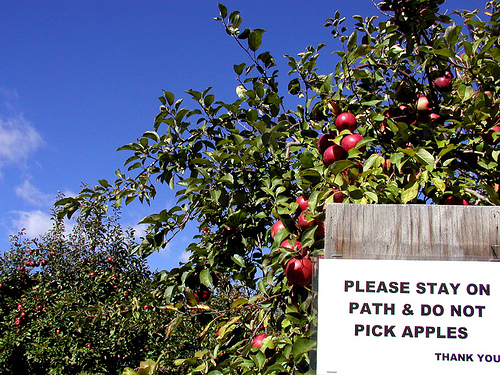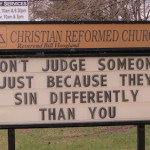We run our website the way we wished the whole internet worked: we provide high quality original content with no ads. We are funded solely by your direct support. Please consider supporting this project.
What Went Wrong in the Garden of Eden?
When Adam and Eve ate from the tree, they imposed their will into the center of Paradise, and this was the act that destroyed Paradise. They invaded the proper domain of God. Instead of recognizing that they were supposed to derive life from the center, they placed themselves in the center. They tried to become “like God.”
The beauty of creation depends on the integrity of the distinction between the complementary centers and the source of the center. The “No Trespassing” sign placed at the center of the garden represents the warning to preserve this boundary and thus the order, beauty, and life of creation. Everything depends on humans remaining humans and not trying to be God—not trying to be their own source center.

Adam and Eve violated this boundary. They thrust themselves into the center of the garden to try to make themselves “wise like God.” They tried to design their own space, as it were, with themselves as the center. And we do the same. We try to make creation—and God—revolve around us. Instead of remaining content being complementary centers, we try to make everything complement us. We attempt to use things and people to derive our worth, meet our needs and expectations, or improve our lives in some way. And we “know good and evil” in the process, for we invariably judge things as “good” or “evil” on the basis of how well they play the idolatrous role we assign them.
Living as the source center means living as judge. But we were not created to function as the source center. We were created to function as complementary centers. We have no life in ourselves to dispense to other centers. Consequently, our center is not one of fullness but of emptiness. Without God as our center, we are not a source of life but a vacuum that sucks life. We can’t radiate life in other centers; we can only try to draw life from them. The world and God revolve around us, and we become a virtual black hole, as depicted by the diagram below.

It is out of the depravity of this black hole that we function as a center, playing God, judging good and evil.
This is life “in the flesh” or life “in Adam.” It is life lived under the serpent’s lie and thus life lived as though we were the center. This way of life is diametrically opposed to God, for it makes it impossible for the fullness of God’s love to flow into us and through us.
In this fallen way of life, people and things have worth only to the extent that they fill us. Instead of ascribing unsurpassable worth to others because the Creator does, we ascribe limited worth to people depending on our judgment of them. Do these people love me? Do they please me? Do they benefit me? Do they affirm me? Do they agree with my opinions? We are the ones who declare that someone or something is good or evil, for we have set ourselves up as the center around which everything revolves and, therefore, the standard against which everything is measured.
—Adapted from Repenting of Religion, pages 68-71
Category: General
Tags: Garden of Eden, Idolatry, Judgment, Repenting of Religion, Sin, Temptation
Topics: Creation Care
Related Reading

Sermon: The Judgment Boomerang
The wrath of God is a misunderstood topic. In this sermon, Greg shows how sin has natural consequences that boomerang back to us. While God’s wrath has serious consequences for us, we need to understand how God uses his wrath. In the clip, Greg talks about the mistaken picture of God that allows for the…

The Sine Qua Non of the Kingdom
In contrast to the habit of judgment which I challenged in the previous post, God calls his people to love the way that God loves. But what exactly does this mean? People have a lot of screwy ideas about “love” today. We use the word “love” to mean a lot of different things, from sexual…

The Nature of Temptation
How does temptation work? Based on James 1:13-16, Greg unpacks the way that desire can give birth to sin. But desire is actually rooted in our longing for God, and the desire itself—and therefore the temptation itself—is not in and of itself a sin. God created us with a “hungry heart” so that he could…

Challenging the Habit of Judgment
Jesus said, “Do not judge, or you too will be judged. For in the same way you judge others, you will be judged, and with the measure you use, it will be measured to you” (Matt 7:2). In our world where we encounter a nearly constant stream of judgments on social media or the news,…

Why did God create me to be a pedophile?
Question: Since the first time I experienced a sex drive it’s been directed towards little children. I’ve never acted on this, for I know it’s wrong. But it torments me. Why would God created me with pedophile cravings? Answer: I’m so sorry for your condition and greatly respect the fact that you have committed yourself…


